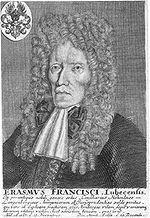
1627 - 1694 Person Name: Erasmus Fink Hymnal Number: 503 Author of "O wie ist der Weg so schmal" in Vollständiges Marburger Gesang-Buch Finx, Erasmus, was b. at Lübeck, Nov. 19,1627. After studying law at various universities and acting for some time as travelling tutor, he settled, at Nürnberg as writer and corrector for the press, remaining there till his death, Dec. (Oct.?) 20, 1694.
Under the name of Francisci (from his father's Christian name of Francis) he published a large number of historical and religious works. Of his some 200 hymns, which mostly appeared interspersed in his devotional works, two have passed into English:—
i. 0 Herr gieb Acht. (Christian Warfare.] In his Ruhestunden, pt. iii. p. 1007, Leipzig, 1680, in 12 stanzas Translated as, "Lord, watch each hour," as No. 689 in pt. i. of the Moravian Hymn Book, 1754.
ii. 0 wie ist der Wag so schmal. [The Narrow Way. In his Gold-Kammer, pt. ii. p. 303, Nürnberg, 1668, in 8 stanzas. Translated as, "O how narrow is the way," by Miss Warner, 1858 (edition 1861, p. 445). [Rev. James Mearns, M.A.]
--John Julian, Dictionary of Hymnology (1907)
Erasmus Finx


 My Starred Hymns
My Starred Hymns



